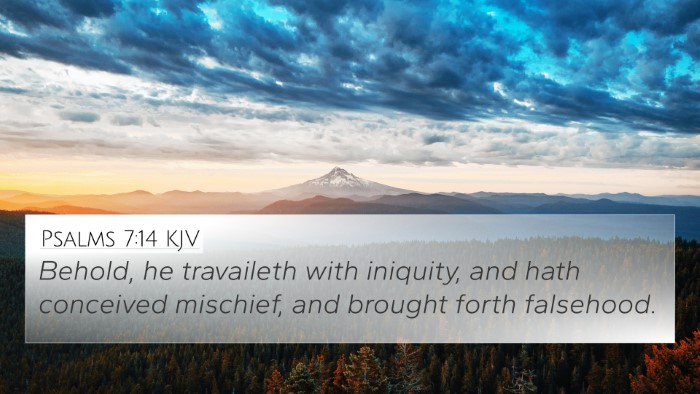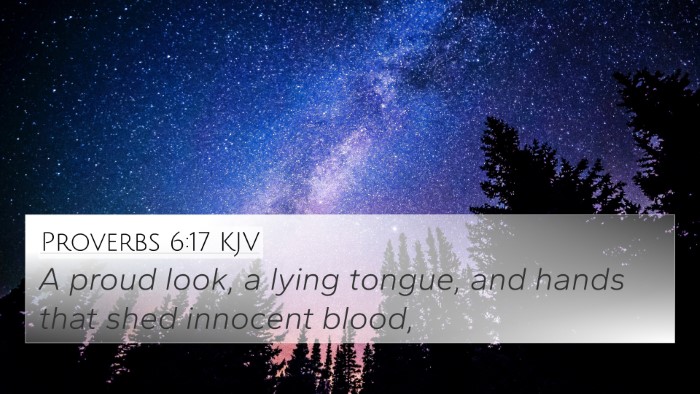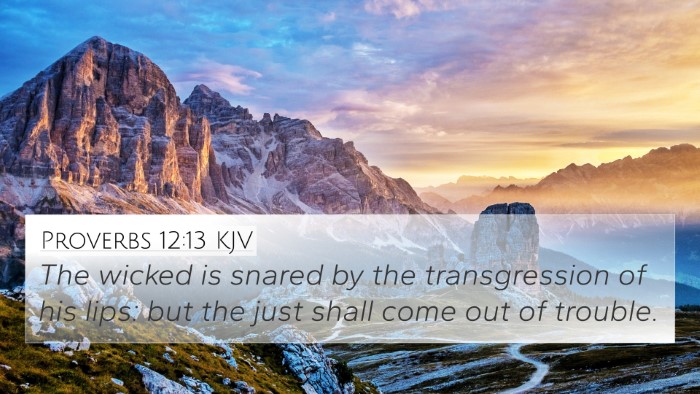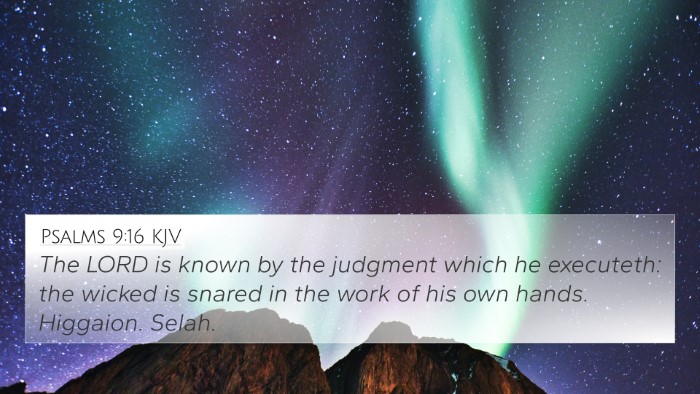Understanding Psalms 140:11
This verse states, "Let not an evil speaker be established in the earth: evil shall hunt the violent man to overthrow him." In analyzing this scripture, we draw insights from renowned public domain commentaries including those by Matthew Henry, Albert Barnes, and Adam Clarke.
Verse Meaning
Psalms 140:11 highlights the consequences of evil speaking and the inherent justice that follows wrongdoing. The psalmist implores God to prevent the establishment of the wicked among the people, emphasizing the belief that those who engage in evil and slander will ultimately face their own destruction.
Key Insights from Commentaries
-
Matthew Henry:
Henry suggests that the psalmist's prayer reflects a desire for justice. The request for evil speakers not to be established points to the hope that God will intervene to protect the innocent and confront the wicked.
-
Albert Barnes:
Barnes highlights the inevitability of evil's self-destruction. He notes that those who practice violence and evil shall ultimately be pursued by their own malevolence, leading to their downfall.
-
Adam Clarke:
Clarke emphasizes the destructive nature of evil speech. He interprets the verse as a warning that those who do harm through their words or actions will not flourish, as they are subject to the divine judgment inherent in their wrongdoings.
Related Bible Cross-References
To further enrich the understanding of Psalms 140:11, several cross-references can be considered:
- Proverbs 11:21: "Though hand join in hand, the wicked shall not be unpunished: but the seed of the righteous shall be delivered." - This verse parallels the theme of divine justice against evil.
- Isaiah 54:17: "No weapon that is formed against thee shall prosper; and every tongue that shall rise against thee in judgment thou shalt condemn." - This emphasizes God's protection from slander and evil.
- Galatians 6:7: "Be not deceived; God is not mocked: for whatsoever a man soweth, that shall he also reap." - The principle of retribution connects closely with the themes in Psalms 140:11.
- Luke 6:45: "A good man out of the good treasure of his heart bringeth forth that which is good; and an evil man out of the evil treasure of his heart bringeth forth that which is evil." - This reinforces the consequences of one's speech.
- 2 Thessalonians 1:6: "Seeing it is a righteous thing with God to recompense tribulation to them that trouble you." - God's righteousness in judgment is a common thread.
- Psalm 101:5: "Whoso privily slandereth his neighbour, him will I cut off: him that hath an high look and a proud heart will not I suffer." - A direct link to the topic of slander and God’s judgment.
- James 1:20: "For the wrath of man worketh not the righteousness of God." - This highlights the futility of human anger against God's justice.
Thematic Connections
Psalms 140:11 reveals profound themes regarding the nature of evil, the power of speech, and the assurance of divine justice:
- Evil and its Consequences: The text reflects a sobering reminder that evil actions have repercussions, emphasizing a moral universe where justice prevails.
- Protection from Evil: The psalmist's plea illustrates a desire for safety from the harm caused by evil speakers, echoing the sentiments found in various other psalms.
- Divine Justice: The interplay between divine intervention and human actions showcases a critical aspect of God's character—a protector and judge of humanity.
Cross-Referencing Methods for Deeper Understanding
For those looking to delve deeper into scriptures and their meanings through cross-referencing, consider the following methods:
- Utilize a Bible concordance to find direct connections between verses mentioned in this analysis.
- Employ a Bible cross-reference guide to explore themes of justice and evil throughout scripture.
- Engage in cross-reference Bible study, focusing on how the themes presented in Psalms are echoed throughout both the Old and New Testaments.
Conclusion
Psalms 140:11 serves as a powerful reminder of the impact of our words and the importance of seeking divine justice. The shared insights from notable biblical scholars paint a comprehensive picture of the verse's significance. By employing effective cross-referencing techniques, readers can deepen their understanding of interconnected biblical themes and gain a fuller appreciation for the wisdom contained within Scripture.












